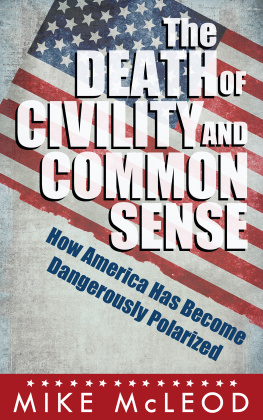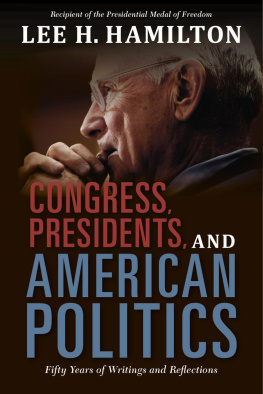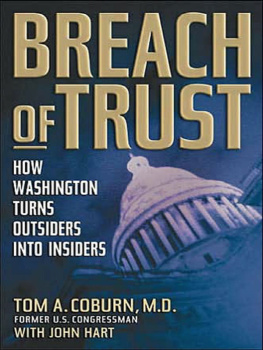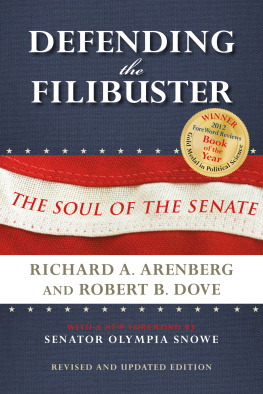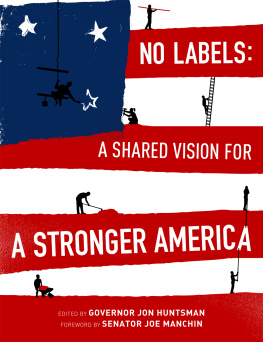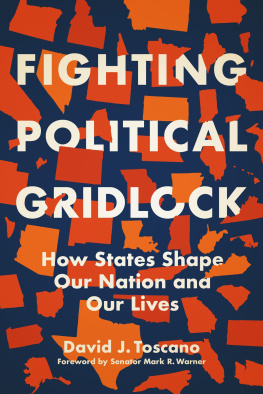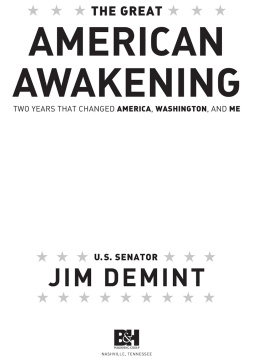Fighting for
Common Ground
Fighting for
Common Ground
How We Can Fix the
Stalemate in Congress

Olympia Snowe

WEINSTEIN
BOOKS
Copyright 2013 by Olympia Snowe LLC
Selection from What Moderation Means by David Brooks from the New York Times, October 25, 2012. 2012 the New York Times. All rights reserved. Used by permission and protected by the Copyright Laws of the United States. The printing, copying, redistribution, or retransmission of this content without express written permission is prohibited.
All rights reserved. No part of this book may be used or reproduced in any manner whatsoever without the written permission of the Publisher. For information address Weinstein Books, 250 West 57th Street, 15th Floor, New York, NY 10107.
Library of Congress Cataloging-in-Publication Data is available for this book.
ISBN 978-1-60286-218-0 (e-book)
Published by Weinstein Books
A member of the Perseus Books Group
www.weinsteinbooks.com
Weinstein Books are available at special discounts for bulk purchases in the U.S. by corporations, institutions and other organizations. For more information, please contact the Special Markets Department at the Perseus Books Group, 2300 Chestnut Street, Suite 200, Philadelphia, PA 19103, call (800) 810-4145, ext. 5000, or e-mail .
Editorial production by Marrathon Production Services. www.marrathon.net
BOOK DESIGN BY JANE RAESE
Text set in 13-point Perpetua
FIRST EDITION
10 9 8 7 6 5 4 3 2 1
To the people of Maine for granting me their trust and grounding me in the values so essential for public service.
Contents
Fighting for
Common Ground
W HEN I ANNOUNCED I would not run for reelection to the Senate in February 2012, many people asked me the same question: Was I relieved? The implication was that I was weary of the increasing bickering of recent Congresses and that I was worn down by it.
Nothing could be further from the truth. Ive never backed down from a fight and I relish a good debate.
Some of these same well-wishers went on to express the hope that I would finally be able to relax.
No chance.
I have no intention of retiring. I love to work as much as ever.
But the Senate, as well as the 112th Congress, whose term ended in January 2013, was no longer a legislative body where the key issues facing the country could be resolved. I decided not to seek reelection only when I came to the sad conclusion that I could more effectively serve my country from outside the Senate than from within.
What motivated me to dedicate myself to public service for nearly two-thirds of my life was the chance to produce results for those people who entrusted me to be their voice and their champion. I found it exceedingly frustrating that an atmosphere of polarization and my-way-or-the-highway ideologies had become pervasive in our governing institutions, compromising our ability to solve problems at what was a time of monumental challenge for our nation.
The Senate as a whole simply was not doing the job granted to it under the Constitution. The Founding Fathers gave individual senators considerable power and influence, yet we were unable to offer solutions to problems on the floor of the Senate because we were prevented from proposing amendments. Few bills even reached the floor, and when they did, debate was frequently stifled or curtailed by overuse of the filibuster and other procedural gymnastics. Senate committees traditionally prepare bills that can and should be thoroughly talked through in debate, but in recent years that work has been bypassed. All too frequently, a bill was drafted behind closed doors and reported to the floor, then a quick up-and-down vote was forced on the entire proposal.
It was a stunning measure of our dysfunction that we were unable to pass a federal budget. After 2009, the last year in which a budget became law, the legislative branch failed year after year to fulfill one of its most basic functions. And year after year, Congress could only enact temporary provisions to keep the country running, let alone undertake any of the work essential to the nations long-term economic health like regulatory reform, changes to the creaking tax code, and reducing our crippling deficits and debt. How could we ever hope to balance a budget if we were never even able to pass one?
At the same time, our two parties had become more extreme and more ideologically driven. Fair-minded legislators were reluctant to reach out across the aisle lest they bring on an intra-party challenge like the ones faced by Senator Bob Bennett in Utah, Senator Lisa Murkowski in Alaska, and Congressman Mike Castle in Delaware when he ran for the Senate.
Outstanding colleagues have had their distinguished careers derailed by a tightly organized subgroup within the main Republican Party that is more interested in taking down individuals with whom they dont agree than in electing representatives who will find bipartisan legislative solutions to Americas problems.
Democrats were not immune to the new political reality. In 2010 in Arkansas, unions spent an estimated $10 million trying to defeat Senator Blanche Lincoln. She narrowly survived a primary run-off with Lieutenant Governor Bill Halter, but was defeated in the general election. I served with Blanche on the Senate Finance Committee and saw firsthand her tenacious commitment to her state.
Democrats even turned on a former vice presidential nominee when in 2006, Joe Lieberman lost a primary in Connecticut to a more liberal candidate, Ned Lamont, only to run and win as an independent. Joe had built a distinguished record on national security, but was viewed as too conservative and too close to then-President Bush. These were both instances of outstanding public servants being targeted by their own party.
As the same take-it-or-leave-it divisions have been echoed in the media, more and more constituents told me they simply no longer watched the news. I understand why so many Americans are fed up with government. The 112th Congress was almost universally derided as the worst ever. It was the most polarized body since the end of Reconstruction, according to one study, and I grew embarrassed by its partisan bickering, inactivity, and refusal to address the vital challenges facing America. Our job approval ratings were deservedly terriblein some surveys the percentage of Americans who approved of the Congresss performance plummeted into historically low single digits.
When someone mentioned to Senator Tom Coburn (R-OK) in 2011 that Congress was at a 13 percent approval rating, he replied, I want to know who those 13 percent are. Senator Michael Bennet (D-CO) published a chart that showed that our popularity was on a par with that of Hugo Chavez and significantly less than perennial favorites like bankers, lawyers, and the Internal Revenue Service.
Im not a person who tends to rhapsodize about the past and how things used to be better, but I know enough Senate history to understand that the 112th was not typical. Earlier in my own career, and throughout its history, the Senate has transcended its divisions, risen to the occasion as an institution, and earned its status as the worlds greatest deliberative body, a description that in recent times is often tinged with sarcasm.
Next page

